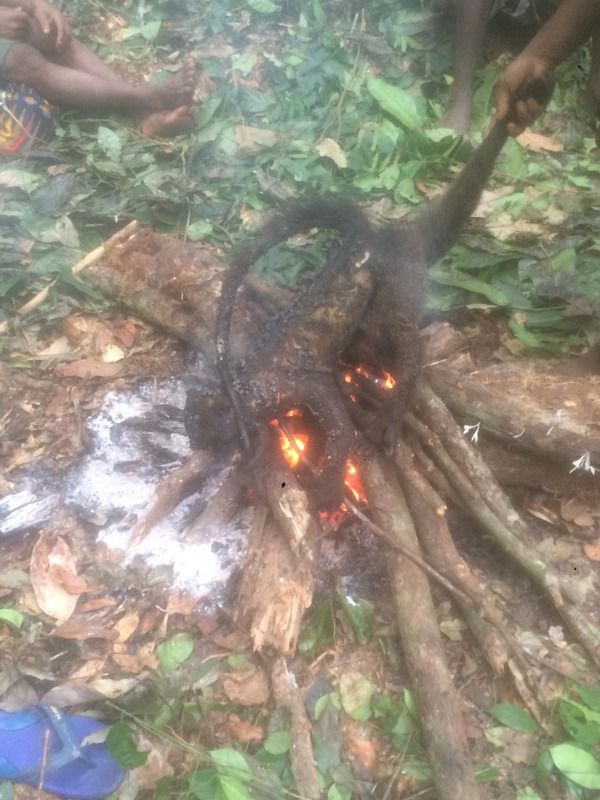It's Baaaack...
Suppose it's time for more hand wringing and hyperventilation...
quote:
Congo announces 1st confirmed death from Ebola outbreak
Associated Press Associated Press•May 10, 2018
KINSHASA, Congo (AP) -- Congo's minister of health says the first death from a new outbreak of Ebola in the country's northwest has been confirmed along with 11 other cases of people sickened by the virus.
Health Minister Oly Ilunga said seven people with the hemorrhagic fever were hospitalized in Bikoro as of Thursday. He says four new cases and one death also have been reported in the town of Ikoko Impenge. He says three nurses are among those infected.
Ilunga says 17 deaths that drew the attention of health officials over the weekend to the region had not yet been confirmed as resulting from Ebola. He says the situation calls for an immediate and energetic response.
The World Health Organization and officials from other international health groups are in the area to help contain the spread of the deadly virus.
11 May 2018, 03:15
NavalukNot going to help wildlife at that rate.
The epidemiology in a place like the Congo has to be nonexistent. It's probably always somewhere.
Eboli along with Aids, Marburg, Lassa, SARS/MERS, and Rift Valley Fever come straight from Mother Nature's kitchen. She's trying very hard to thin the human population explosion on the African Continent. Food and water shortages along with Malaria are just the icing on the cake.
But the ubiquitous Mosquito is still the most deadly animal on the continent.
Bottom Line - Africa is not for sissies.
12 May 2018, 05:27
BaxterBEbola is a fascinating virus. The Hot Zone by Richard Preston about it is good. My dad used to service the xerox machine at the Reston monkey house where the outbreak occurred. Before it was torn down, it was a daycare...
21 May 2018, 18:33
MikeBurkeCannot understand why it is a problem especially since it was eaten after the hair was burned off, a little on the rare side....
BTW Photobucket is allowing us to link photos to forums again.

Thanks for the link to the article in The Hill. That's an informative piece. It'll be interesting to see how quickly and effectively health care workers can contain this, given the challenges this particular outbreak poses.
22 May 2018, 12:09
Pondoroquote:
Originally posted by Opus1:
Eboli along with Aids, Marburg, Lassa, SARS/MERS, and Rift Valley Fever come straight from Mother Nature's kitchen. She's trying very hard to thin the human population explosion on the African Continent. Food and water shortages along with Malaria are just the icing on the cake.
But the ubiquitous Mosquito is still the most deadly animal on the continent.
Bottom Line - Africa is not for sissies.
What you say here is spot on...nature is frantically trying to halt the human explosion in Africa..
From the book.
“First, they suspected (based on earlier studies) that the reservoir is a mammal. Second, they noted that Ebola virus disease outbreaks in Africa had always been linked to forests. (Even the urban epidemic at Kikwit had begun with that charcoal maker out amid the woods.) It seemed safe to assume, therefore, that the reservoir is a forest creature. Third, they noted also that Ebola outbreaks had been sporadic in time—with years sometimes passing between one episode and the next. Those gaps implied that infection of humans from the reservoir is a rare occurrence. Rarity of spillover in turn suggested two possibilities: that either the reservoir itself is a rare animal or that it’s an animal only rarely in contact with people.”
“Kikwit, in Zaire, lay about three hundred miles east of Kinshasa. It differed from Yambuku, and Mayibout 2, and the timber camp outside Booué in one crucial way: It was a city of two hundred thousand people. It contained several hospitals. It was connected to the wider world in a way that those other outbreak sites weren’t. But like them it was surrounded by forest.
The first identified case in the Kikwit outbreak was a forty-two-year-old man who worked in or near that forest and probably, to some small extent, disturbed it. He farmed several patches of cleared land, planting corn and cassava, and made charcoal from timber, all at a spot five miles southeast of the city. How did he get his wood supply, how did he clear daylight for his gardens? Presumably by cutting trees. This man fell sick on January 6, 1995, and died of a hemorrhagic fever a week later.
By that time he had directly infected at least three members of his family, all fatally, and launched the infection into his wider circle of social contacts.
Excerpt From
Ebola: The Natural and Human History of a Deadly Virus
David Quammen

